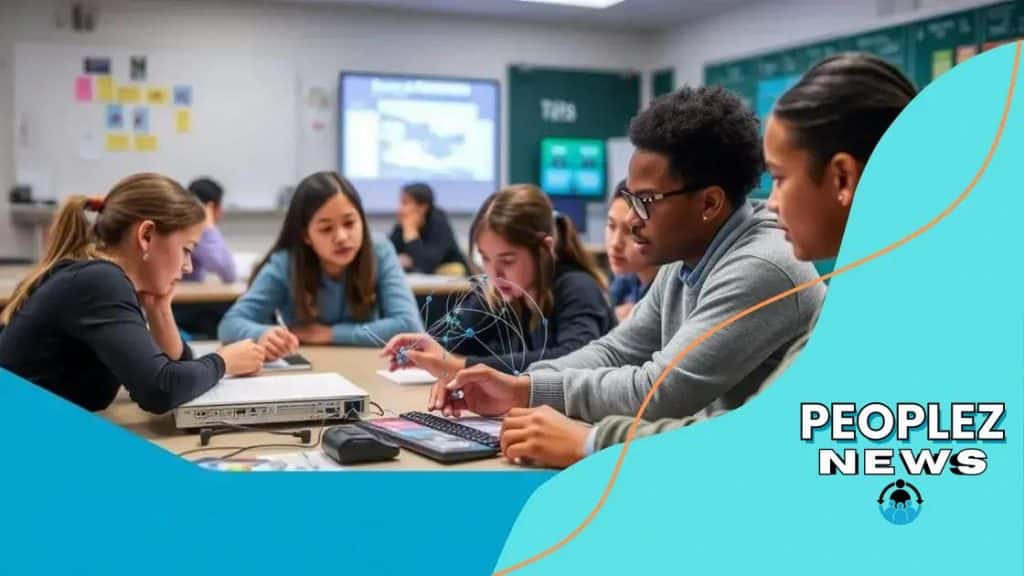Preparing students for AI-driven job markets

Advertisements
Preparing students for AI-driven job markets requires fostering a growth mindset, integrating technology in education, and emphasizing continuous learning through project-based activities and self-directed resources.
Preparing students for AI-driven job markets is crucial in today’s fast-evolving landscape. What if the skills your child learns today make all the difference tomorrow? In this article, we’ll discuss how education can evolve to meet the demands of the future workforce.
Understanding AI’s impact on future careers
Understanding how AI is shaping future careers is essential for students today. The job landscape is constantly changing and adapting. As technology advances, many roles will evolve, and new career paths will emerge. This shift requires students to be agile and ready for the future workplace.
Advertisements
The Role of AI in Various Industries
AI is making significant waves across many sectors. For instance, in healthcare, AI aids in diagnostics and patient care. In finance, algorithms help in fraud detection and customer service. The impact is profound, and students must be aware of these changes.
- Healthcare: AI in diagnostics and personalized treatment.
- Finance: Enhancing fraud detection with machine learning.
- Manufacturing: Automating processes to improve efficiency.
Moreover, understanding AI tools can also help students in developing essential skills. These include problem-solving, data analysis, and critical thinking. Learning to work alongside AI will be crucial. Tools like chatbots, data analytics software, and creative design programs are just a few examples where students can gain experience.
The Skills Needed for AI-Driven Careers
To thrive in an AI-driven job market, students should focus on building a range of competencies. These skills go beyond technical knowledge and include soft skills such as teamwork and adaptability. As the workplace evolves, being proficient in teamwork allows for better integration when collaborating with AI systems.
- Technical skills: Data analytics, programming languages.
- Soft skills: Communication, collaboration, adaptability.
- Creative thinking: Developing innovative solutions using technology.
In addition to technical knowledge, the ability to adapt and learn is invaluable. Students who can upskill or reskill will find themselves ahead in the competitive job market. This flexibility is crucial as AI tools continue to transform industries.
Finally, given the rapid pace of change, cultivating a mindset geared towards lifelong learning is vital. By embracing AI literacy and staying curious, students can navigate their future careers more effectively and confidently. Understanding AI‘s role in the future of work will empower students to take control of their career paths and thrive.
Skills students need for AI-driven roles
Skills for AI-driven roles are essential for students preparing for the future. As technology evolves, the demand for specific abilities rises. Students must focus on developing these skills to align with the needs of modern workplaces.
Technical Skills Required
Having a solid foundation in technical skills is crucial. These include knowledge of programming languages, data analytics, and understanding AI concepts. For example, languages like Python and R are widely used in data science and machine learning.
- Programming: Proficiency in Python, Java, or R.
- Data Analysis: Skills in using Excel, SQL, and data visualization tools.
- Understanding AI: Basic concepts of machine learning and algorithms.
Moreover, students should learn how to apply these technical skills practically. Engaging in projects that involve real-world AI applications can greatly enhance their abilities and portfolios. Working with datasets, building models, and analyzing outcomes will provide hands-on experience.
Soft Skills for Success
In addition to technical expertise, soft skills are equally important in AI-driven careers. Students must cultivate traits like effective communication, teamwork, and problem-solving. These skills help them work well with others and adapt to various situations.
- Communication: Ability to explain complex concepts clearly.
- Teamwork: Collaborating effectively with diverse teams.
- Problem-solving: Applying critical thinking to find solutions.
Furthermore, adaptability to change and a willingness to learn are vital. The AI landscape is continuously changing, so embracing lifelong learning gives students an advantage. They should follow trends, attend workshops, and seek mentorship opportunities.
Finally, fostering a creative mindset will be beneficial. Students should learn to think outside the box and envision innovative solutions using AI. This skill will set them apart in a competitive job market and prepare them for future challenges.
How schools can adapt curriculum

How schools can adapt their curriculum is vital for preparing students for the AI-driven job market. Lessons must evolve to incorporate the skills and knowledge essential for future careers. By doing so, schools can ensure that students are ready to tackle the challenges presented by technology.
Integrating Technology in the Classroom
One key approach is integrating technology directly into teaching methods. Schools can use AI tools and other digital resources to enhance learning experiences. For example, interactive platforms and learning management systems can provide personalized learning paths for students.
- Utilizing online resources for self-paced learning.
- Implementing coding and robotics classes in the curriculum.
- Offering workshops on using AI tools and software.
Additionally, teachers can foster collaboration among students by using technology. Group projects that require students to use AI tools can stimulate critical thinking and problem-solving skills.
Emphasizing Critical Thinking and Creativity
Alongside technology, schools must emphasize critical thinking and creativity. These skills are essential as students learn to navigate an increasingly complex world shaped by AI. Schools can encourage these attributes by offering project-based learning opportunities.
- Creating real-world problem-solving projects.
- Encouraging students to brainstorm innovative solutions.
- Facilitating discussions on ethical implications of AI.
Furthermore, fostering an environment where failure is seen as part of the learning process can help students explore new ideas without the fear of making mistakes. This mindset encourages creativity and resilience, essential components for thriving in AI-related fields.
Finally, continuous professional development for educators is crucial. Teachers should stay informed about the latest advancements in AI and related technologies. Adapted curricula depend on their ability to deliver current and relevant content effectively. Schools can support this by providing training and resources on emerging technologies.
Real-world examples of AI integration
Real-world examples of AI integration showcase how technology is transforming various industries. Understanding these applications helps students grasp the relevance of their studies. Learning about how AI impacts everyday jobs can motivate them to pursue related careers.
Healthcare Innovations
In healthcare, AI is revolutionizing patient care by improving diagnostics and treatment plans. For instance, machine learning algorithms analyze medical images to detect diseases like cancer at early stages. Systems such as IBM Watson provide physicians with evidence-based recommendations.
- AI for early disease detection through imaging.
- Personalized medicine tailored to individual patients.
- Robotic surgeons assisting in complex procedures.
These advancements not only enhance patient outcomes but also streamline hospital operations, demonstrating the power of AI in improving healthcare quality.
Finance and Banking
The finance sector also benefits significantly from AI integration. Algorithms analyze vast amounts of data to identify patterns and predict market trends. This capability supports investment decisions and risk management.
- Fraud detection systems using AI to monitor transactions.
- Automated trading platforms optimizing investment strategies.
- AI chatbots providing customer support and financial advice.
These applications improve efficiency and enhance customer service, illustrating how AI is reshaping the finance industry.
Education Technology
In education, AI tools personalize learning experiences. Systems adapt curricula based on individual student performance. For example, software can identify areas where students struggle and recommend targeted resources.
- Adaptive learning platforms promoting personalized education.
- AI tutoring systems providing additional help.
- Data analysis tools assisting teachers in tracking student progress.
Such technologies not only enhance learning but also empower educators to meet diverse student needs effectively.
Moreover, the entertainment industry uses AI to recommend content based on user preferences. Streaming services utilize algorithms that analyze viewing history to suggest movies and shows, making entertainment more engaging.
From healthcare to education and beyond, these examples illustrate the vast potential and impact of AI in our daily lives. Studying these real-world applications can inspire students to think creatively about their future careers.
Preparing students for continuous learning
Preparing students for continuous learning is crucial in today’s fast-paced world. With technology and industries evolving rapidly, students must develop habits that encourage lifelong education. This approach ensures they remain relevant and competitive in the job market.
Emphasizing Growth Mindset
One way to prepare students is by fostering a growth mindset. A growth mindset is the belief that abilities can improve with effort and persistence. Teachers can encourage this by praising effort over talent.
- Encouraging students to embrace challenges.
- Reinforcing the importance of resilience in overcoming obstacles.
- Providing constructive feedback to guide improvement.
When students understand that their skills can grow, they are more likely to seek challenges and invest in their learning journey.
Providing Resources for Self-Directed Learning
In addition, schools can provide students with resources to support self-directed learning. This includes access to online courses, workshops, and educational tools. By encouraging students to take charge of their education, they can explore topics deeply.
- Online platforms for skill development, like Coursera and Udemy.
- Encouraging attendance at seminars and workshops.
- Promoting library resources and research opportunities.
These resources foster independence and help students learn how to acquire new knowledge as needed.
Furthermore, technology plays a significant role in continuous learning. Students should be taught to utilize digital tools effectively. Tools such as educational apps and online communities can enhance their understanding and encourage collaboration.
Moreover, schools can promote project-based learning, which enables students to engage in hands-on experiences. This method encourages inquiry and critical thinking, essential skills for continuous learning.
Collaborative projects also teach students how to work with others. This teamwork reinforces not only the subject matter but also develops communication skills. Encouraging peer-to-peer learning can broaden perspectives and enhance understanding.
Finally, instilling a passion for reading and exploring diverse subjects fosters curiosity. Creating a learning environment that values diverse perspectives helps nurture well-rounded individuals.
FAQ – Frequently Asked Questions about Preparing Students for AI-Driven Job Markets
What is a growth mindset and why is it important for students?
A growth mindset is the belief that abilities can improve with effort. It encourages students to embrace challenges and persist through difficulties, helping them thrive in a constantly changing job market.
How can technology enhance learning for students?
Technology can provide personalized learning experiences, access to online courses, and collaborative tools that allow students to develop critical skills necessary for the future workplace.
What is project-based learning and why is it beneficial?
Project-based learning engages students in hands-on projects that apply their knowledge to real-world problems. This approach promotes critical thinking and teamwork, essential skills in the AI-driven job market.
How can students prepare for continuous learning throughout their careers?
Students can prepare by developing a habit of self-directed learning, being open to new experiences, and seeking opportunities for professional development and skill enhancement.





